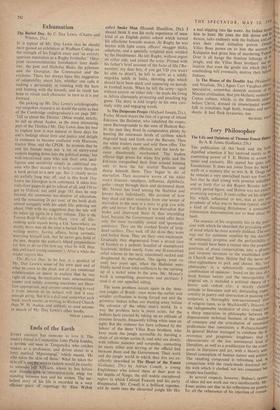Ends of the Earth
EVERY creature has someone to love it. The snake's friend is Constantine John Philip lonides, a terrible old man in Tanganyika who catches snakes as a profession, and drives about in a lorry marked 'Mparangogi,' which means, 'He who takes the skin off them.' What he takes the skin off is norftjanakes (which would be cruelty to animals), hi1r,Afficans, whom he has .before now beatenptyith.t rhinoceros-hide whip for standing between him and his wishes. The tur- bulent story of his life is recorded in a very efficient -piece of reportage by Alan Wykes
called Snake Man (Hamish Hamilton, 21s.). I should think it was his early experience of man- kind at an English public school which turned his affections towards snakes. At Rugby he was beaten with light canes, officers' swagger sticks, ashplants, and a specially weighted stick wielded by the Headmaster. He left Rugby, without regret on either side, and joined the army. Primed with his father's brief account of the facts.of life (`Re- member, my dear boy, if you get VD you won't be able to shoot'), he left to serve as a wildly unpukka sahib in India, shooting pigs which should have been stuck and appearing on parade in football boots. When he left the army—again without sorrow on either side—he made his living in Africa alternately protecting and pbaching big game. The story is told largely in his own curi- ously witty and engaging words.
In The Desperate People (Michael Joseph, 21s.), Farley Mowat traces the fate of a group of inland Eskimos, the Ihalmiut, who inhabited the empty, open Barrengrounds to the west of Hudson Bay. In the past they lived in comparative plenty by hunting the enormous herds of caribou which migrated back and forth over the Barrens. Then the white traders came and sold them rifles. The rifles were only too efficient, and the herds be- came disastrously overhunted. The traders offered high prices for white fox pelts, and the Eskimos reorganised their lives around hunting only to have the fur market fluctuate and slump beneath them. They began to die of starvation. Then successive waves of the white man's diseases—smallpox, influenza, diphtheria, polio—swept through them and decimated them. Mr. Mowat has lived among the Ihalmiut and knows them individually. His account of how they eked out their existence from one winter of starvation to the next is a story to grip you with pity and terror. For finally it was starvation that broke and destroyed them in that unyielding land, because the Government would offer them only the most incredibly casual and spasmodic assistance. They ate the crushed bones of long- dead caribou. They took off the skins they wore and boiled them. They ate their own excrement. Gradually they degenerated from a proud race of hunters to a pathetic handful of unemployed layabouts, shifted inertly from one ill-conceived relief scheme to the next, relentlessly racked and slaughtered by starvation. The agony went on until two years ago, when the Ihalmiut were finally saved from total extinction by the opening up of a nickel mine in the area. Mr. Mowat's book is compelling, passionate and partisan; 1 read it at one appalled sitting.
The same problem occurs again in the Ama-. zon jungles of Brazil : once more the earlier and simpler civilisation is being forced out and the primitive Indian tribes are wasting away before the advance of the white man's world. In a way the problem here is more acute, for the Indians have reacted by taking up an attitude of extreme ferocity, frequently killing white men on sight/ But the violence has been softened by the labour of the three Villas Boas brothers, who have made the jungle accessible by burning a chain of air-strips across it, and who are slowly, with infinite patience and sympathy, contacting its many tribes and serving as the official link between them and the Government. Their, work and the jungle world in which they live are ex- cellently described in The Heart of the Forest (Gollancz, 25s.) by Adrian Cowell, a young Englishman' who joined them at their post in the depths of Xingu, the still widely unexplored region in which Colonel Fawcett and his party disappeared. Mr. Cowell is a brilliant reporter, and he melts into the elemental jungle life like
a.seal slipping into the water. An Indian Was him to hunt. He joins the fish drives and 0, dances, talks endlessly with the Indians, and , tries their ritual initiation poison. Orland); Villas Boas passes on to him the account 0 Kalapalos had given him of murdering Favicett'c Over it all hangs the timeless lethargy of (II, jungle, and the Villas Boas brothers' sad rc.1 lisation that even the gentle ties which they arc establishing will eventually destroy their bel°" Indians. In The House of the Double Axe (Weidenfeld and Nicolson, 30s.) Agnes Carr Vaughan effers$ speculative, somewhat donnish account of 111 Minoan civilisation, that pre-Hellenic sunburst°, Cretan culture, which, in the fifteenth collar) before Christ, dressed its emancipated women,: folk in crinolines, high heels, waspies and sports shorts. It had flush lavatories, too. MICHAEL FOY






































 Previous page
Previous page